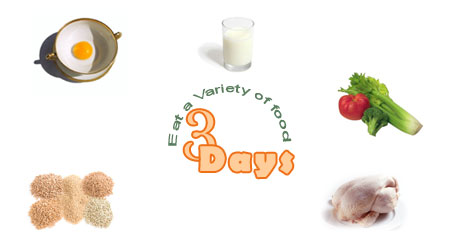|
Sorry to disappoint you. Delicious
as fruit are, they are no match to the nutritional pwer of
veggies. Fruits provided plenty of vitamin A and C, but for B,
E, K and most of the minerals, veggies are better bets. The same
 is
true for phytochemicals and fibre. is
true for phytochemicals and fibre.
You would have to eat huge portions
of a variety of fruits to make up for what youíre missing by
skipping veggies.
If you absolutely cannot stomach
vegetables, eating extra fruit will compensate to some degree,
but fruits and vegetables ate not nutritionally identical. For
instance, while both vegetables and fruits have nutrients like
vitamins C and A (in the form of beta chemicals) are present in
vegetables alone. Cruciferous vegetables like cabbage,
cauliflower, and nolkhol, for example, contain a compound called
sulforaphane that appears to increase the bodyís production of
enzymes that ward off cancer-promoting agents. |
|
Eating the same breakfast, lunch and dinner every day isnít just
boring, itís also nutritionally shortsighted. Dietary variety
ensures that youíre getting all the nutrients your body needs,
especially if youíre dieting. Depending on what your three
squares contain (or donít), you could be missing out on your
daily requirements for any number of nutrients, including
calcium, iron, folic acid and antioxidants. Worse, the potential
for overloading on some harmful substances, like preservatives
or environmental pollutants such us mercury, is higher.

To find out if your diet could use more variety, tally how many
different foods you eat in a three day period. According to the
USDA, 16 or higher means youíve got ample variety, but a score
of 6 or less means youíre probably shortchanging yourself. In
fact, a study examining the diets of nearly 10,000 men and women
found that consuming increased dietary variety within each food
group can boost nutrient adequacy by up to 73 per cent. |

